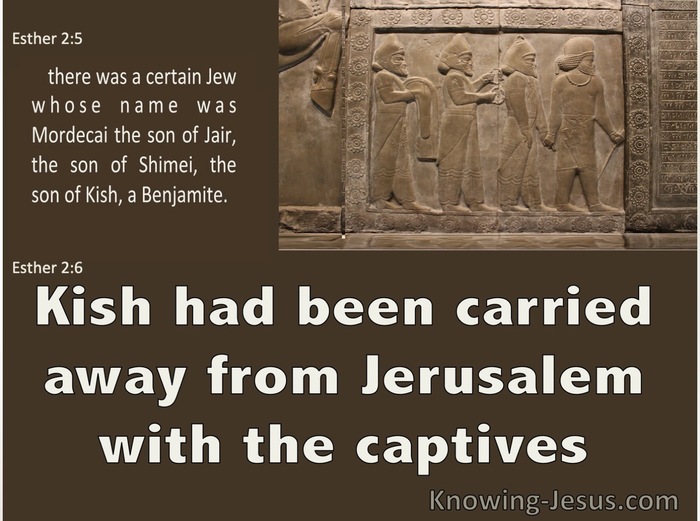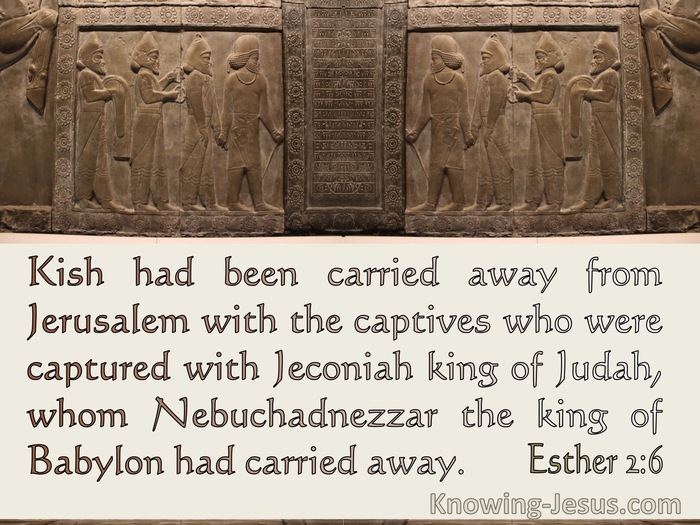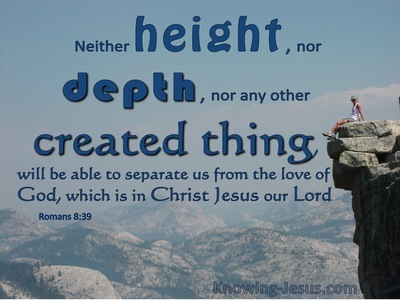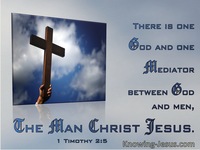◄ What Does Esther 2:6 Mean? ►
who had been taken into exile from Jerusalem with the captives who had been exiled with Jeconiah king of Judah, whom Nebuchadnezzar the king of Babylon had exiled.
Esther 2:6(NASB)
Verse of the Day
At the end of their 70-year exile in Babylon, Cyrus, the great Persian king, decreed that the temple in Jerusalem, destroyed by Nebuchadnezzar, was to be rebuilt, and Jewish exiles were permitted to return to their homeland. Many took advantage and set off with Ezra or Nehemiah on their respective expeditions, but many remained in their land of exile, preferring all the material advantages they now enjoyed.
Among those who remained was a man named Mordecai, a Benjamite and a descendent of Kish (the father of king Saul). He lived in the city of Susa, and cared for his beautiful, young, orphaned niece, Hadassah. Their ancestors, including Jeconiah, the king of Judah, had been removed from the land of Judah many decades earlier, and taken into slavery by Nebuchadnezzar. They too chose not to return to their Jewish homeland and like so many exiles, Mordecai was a Persian name and Hadassah had been renamed 'Esther'.
No doubt, Mordecai was aware of the king's emotional outburst in chapter 1, when his queen refused to appear before him and display her beauty to the king and his inebriated friends. He undoubtedly knew of the king's foolish decision to exile his wife permanently.
It is in chapter 2, that king Ahasuerus began to regret his foolish decision to get rid of his wife, which was done at the bidding of some wicked courtiers. Instead of admitting his folly, Ahasuerus agreed to their next unprincipled suggestion: "Let beautiful young virgins be sought for the king throughout his kingdom, to replace the queen."
Not only were Mordecai and Esther exiled Jews who were content to remain away from the Promised Land, but both were prepared to participate in the king's ungodly beauty contest, despite this being contrary to the godly principles given to Israel through Moses. It appears that the evil perpetrated on the Jewish nation by both the Assyrian and Babylonian empires, including the enslavement of their people, the slaughter of the king's sons, the cruel way Israel's king was blinded with a red hot poker, and the total destruction of the city and sanctuary, had long been pushed to the back of their conscious minds.
The new Persian policy of intermingling and intermarriage was being adopted, but despite their apparent disregard for their Jewish homeland and roots, God had chosen Israel for a particular purpose; to be the nation through whom the Messiah would come. God, in His grace, decided to use Mordecai and Esther to forward his redemptive plan for His people and set their hearts to once again call out to their God.
Both Mordecai and his niece had permitted the comfortable life they enjoyed in the Persian city of Susa to cloud their judgement. It caused them to grow indifferent towards the principles of God. It prevented them from discerning the Lord's will for His people, and hindered them from recognising the importance of returning to their land of Canaan in preparation for the coming of their promised Messiah. But God turned evil to good and caused their complacency to be replaced with a resolve to trust in the Lord and fight for their nation's integrity and right to survive.
God had to stir up their comfortable lives to spur His scattered people into rekindling their national pride, return to the Lord their God, reinstate the Law of Moses, and prompt the people of Israel to begin looking expectantly for their coming king. The unfolding of the story of Esther shows how God intervened in the lives of His chosen people, despite their disinclination to waken both their consciences and their resolve to return to the Lord their God.
Anti-Semitism, severe persecution, and the threat to exterminate the Jews, was the evil intent of the enemy in the days of Mordecai and Esther, but God turned satanic evil to good. He used the wicked plans of godless men in the court of king Ahasuerus to move forward His redemption plan into the next phase of fulfilment, and Esther and Mordecai were tools God used to thwart this evil.
Today, we see anti-Semitism on the rise worldwide and Christian persecution is reaching unprecedented heights, but we also have to remember that God is still in control today, just as He was in the days of Mordecai. Despite the evil plots of Satan to exterminate the Jews and persecute Christians which continues to rage today, may we never forget that God's plans and purposes will come to fruition, and the Lord could use any one of us to forward His redemptive plan, if we are willing to become a tool in His hand.
May we be ready and willing to be used by Him as He chooses and may we rekindle the hope we have in Christ and re-examine our hearts to see if we are walking in spirit and truth and honouring His name in the choices we make.
My Prayer
Heavenly Father, thank You for the wonderful way that You used Esther and Mordecai to prevent the annihilation of the Jewish nation during the time of the Persian empire. I rejoice to see how their faith and hope in You was rekindled and that despite their many failings, You used them to forward Your redemptive plan. I pray that I would not allow the things of this world to undermine my faith in You and my hope in the soon return of the Lord Jesus. Help me to walk in spirit and truth and use me, I pray, in the unfolding of Your wonderful plan of redemption, for the glory of Your holy name. In Jesus' name, AMEN.
Choose a Verse from Esther 2
Esther 2:6 Further Study
- Esther 2:6 in the Parallel Bible
- Esther 2:6 in the Thematic Bible
- Esther 2:6 Cross References
- Esther 2:6 Treasury of Scripture Knowing
- Esther 2:6 Sermons
- Esther 2:6 Prayers
- Esther 2:6 Images
- Choose Chapter
Never miss a post














